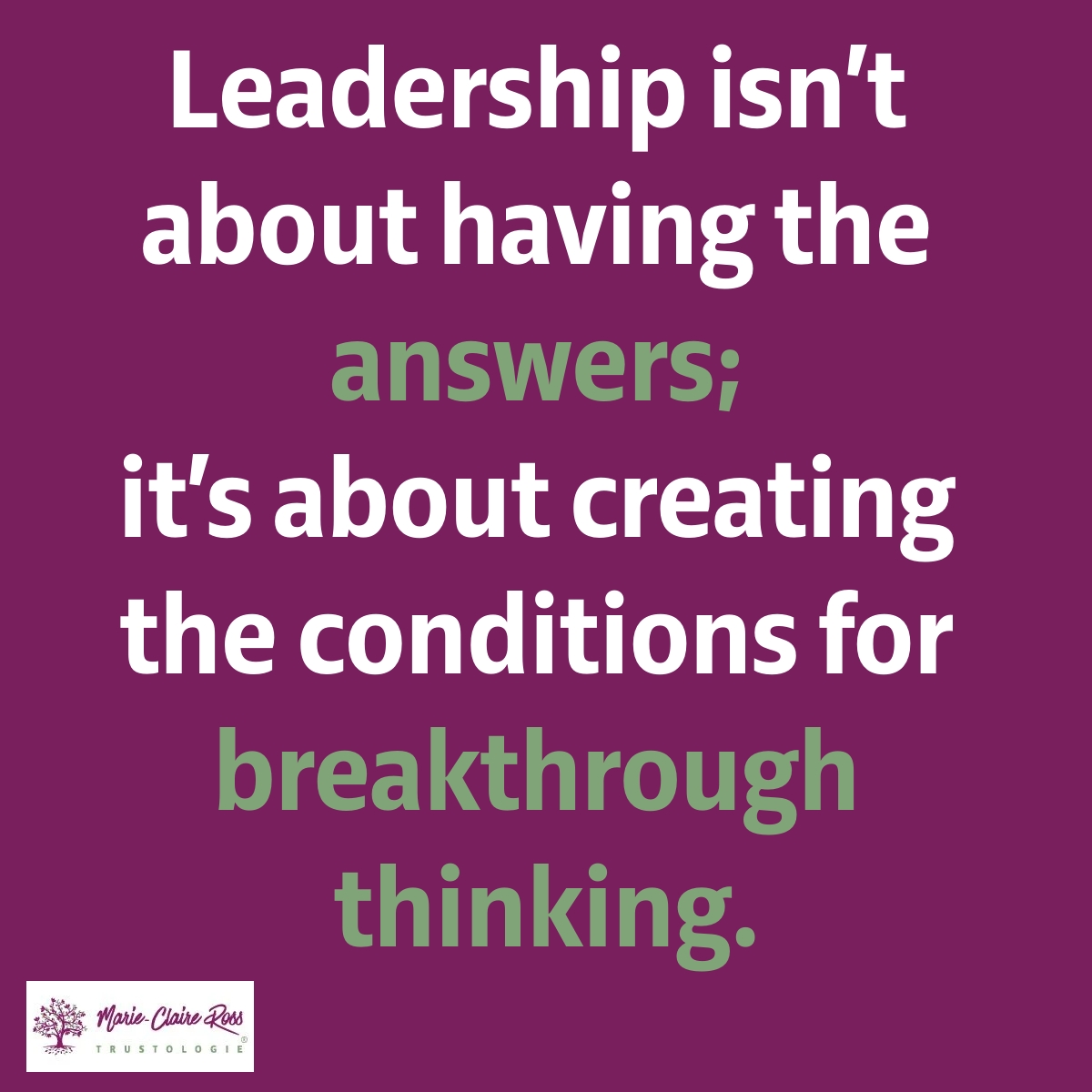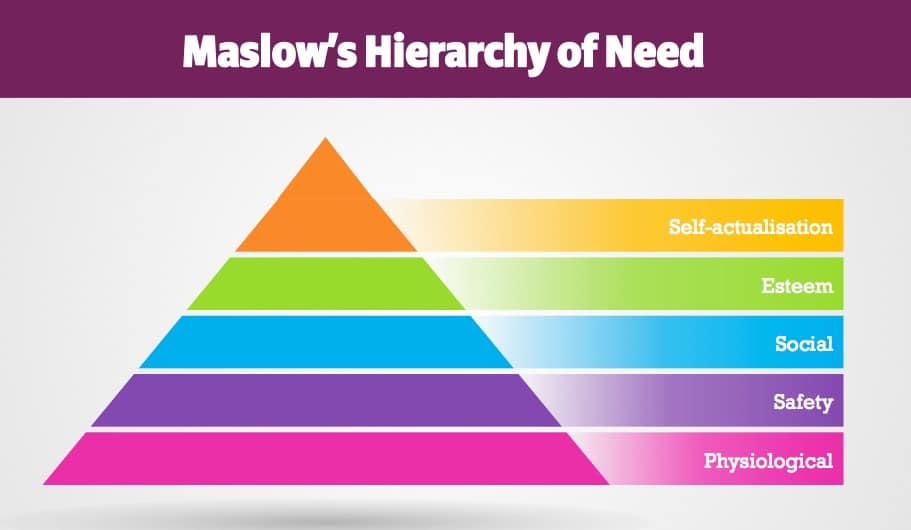8 min read
Beyond the "Why": 5 Coaching Secrets to Unlock Curiosity in Leadership
When my daughter was 17 months old, she discovered a superpower: the word “Why?”For the next two years, it was her response to almost everything.
Develop leaders, strengthen executive teams and gain deep insights with assessments designed to accelerate trust and performance.

Transform how your leaders think and perform with keynotes that spark connection, trust and high-performance cultures.

Explore practical tools, thought-leadership and resources to help you build trusted, high-performing teams.

Trustologie® is a leadership development consultancy founded by Marie-Claire Ross, specialising in helping executives and managers build high-trust, high-performing teams.

5 min read
Marie-Claire Ross : Updated on October 7, 2020

In the race to build our careers, we default into doing what we learnt at school – by building our skills and knowledge. We assume that being smart and capable, the veritable A grade student who tops the class will help us on our career journey.
Take Ben and Emma. Straight out of University, they both get selected to work at a prestigious law firm. A few months into their job and the pleasant realisation that they can do the job well, ignites their personal ambitions, propelling them both to work hard and prove their worth.
Ben becomes addicted to winning and being the best. Outworking, belittling and outthinking Emma and other colleagues is a daily sport. He works hard, often complaining he doesn’t have time and that he can’t rely on others to help him because they aren’t as capable. Unknowingly, he has created a situation where he only gets people’s minimal effort.
On the other hand, Emma realises that while she still wants to aim high, there is a distinct difference between giving your best and being the best. She doesn’t want to be like Ben, who resists sharing information with others and knowing all the gossip. To him, knowledge is power.
Instead, she realises that real power comes not from knowledge, but from the wisdom she can leverage in her networks. She focuses on building trust with those most important for her career. Unlike Ben, she doesn’t do that in a sycophantic manner, honing in on the ones with the most power. Instead, she focuses on the people around her that she needs to work with. She tirelessly breaks down barriers with those above, who were initially hesitant to work openly with her and connects with those below and beside her to improve delegation reliance and interdependence.
Before long, she becomes a highly admired team leader who magnetically draws the most talented people into her team. While Ben is his own worst enemy – only seeing value in working with people who have great ideas and resorting to bullying other team members to perform. Few people want to work with him and his team degenerates into poor performance and a high-stress environment.
Managing your career is really about managing a series of relationships. At some point in their careers, high trust leaders realise there is only so much work that they can do on their own. They humbly ask for contributions and help from others, realising that they can’t be an expert in everything.
Today, business requires a level of collaboration that’s impractical when leaders are egocentric and competitive. Our personal efforts and abilities can only help us get so far. Truly successful leaders have realised that changing their style to a more inclusive, connected one is the only way to succeed to the next level.
If we want to achieve lofty goals, we need to bring others with us. High trust leaders are experts at aligning interests and finding common ground. Counterintuitively, they realise that putting the group’s needs before their own needs generate success.
Here are five tips to become a trusted leader:
Successful high trust leaders have established solid networks of peers and other professionals that enable them to find the right people in any high stakes project. They are always on the lookout for the best and brightest. Their ability to connect people based on interests, values and common needs enable them to build up their team’s capabilities. They never shut out people who are smarter than them. As Dave Logan says in the book Tribal Leadership, “You are only as smart and capable as your tribe. By upgrading your tribe, you multiply the results of your efforts.”
They realise that creating a large network of relationships is through introducing like-minded people to each other, proving that they are there to be of service. Unlike low trust leaders, who avoid introducing people to each other, as they like to have control over the people they know.
High trust leaders realise that everyone is unique. We each have different gifts. We all trust differently – some of us are high in trust and others low. Depending on the situation, we can be trusted or not trusted.
High trust leaders take the time to understand where people are at. They acknowledge when people are in fear and take the time to explain the inherent risks, understanding that some people need more reassurance than others.
Most importantly of all, they realise that they need to customise their communication differently for each person, to accommodate their needs (and fears).
Trust is dynamic. If you are not proactively building trust, it is declining. High trust leaders are self-reflective of their behaviours. They know that if people don’t trust them, it will make it much more difficult to get everyone on the same page. They are constantly reviewing their behaviours and relationships, taking the time to build and maintain trust.
High trust leaders are intentional about trust building. They have studied trust at a comprehensive level and know how to build, judge and rely on trust. Most people don’t often think of trust as a capability that can be learned and explored.
Rather than instinctively deciding how to trust someone, high trust leaders use a strategic process (The Trust Evaluation Framework is a good example). This improves their ability to hire the right people (and fire the wrong ones quickly). Rather than waste time and headspace figuring out how to build trust with low trust direct reports, they know what areas to target in their communication to improve the relationship, but also highlight where people’s performance needs to improve, in a collaborative manner.
Clear communication is all about reducing uncertainty and ambiguity. When employees don’t know what is expected of them or what is going on, they go into fear and low trust.
High trust leaders are focused on what needs to be said. They have clarity of thought and communication. They set clear expectations and accountabilities, in order to drive shared outcomes.
They are also explicit in their intentions, so no-one fears they are coming from self-interest.
And because people give them the benefit of the doubt, they are able to engage others in the vision, ensuring that people are confident that they will deliver on promises.
According to an Imperative study, you can separate the workforce into two groups. The first one (found in 72% of the population) view work as a way to get a paycheck and gain personal advancement.
People just like Ben, who start their careers, competing and always being the winner. Over time, they become burnt out and jaded believing that they are only appreciated for their results and not who they are. Their inability to see that their own behaviour has contributed to the situation ensures that they continue to lead in a way that repels others and stops any type of improvement. Their career progression finishes at a certain level because of their inability to lead others.
On the other hand, 28% of the workforce defines work as being about relationships, making a meaningful impact and personal growth. In other words, leaders like Emma who have had an epiphany that being the best only creates a “dog eat dog world” which is exhausting and not fulfilling. Her focus on building trust ensures that talented employees are drawn to her and that she is highly capable of leading more and more people.
These employees score much better on performance reviews, but quite dramatically have higher net promoter scores, which measures the impact of an employee on the reputation of their employer. Employees like Ben are brand detractors and on average hurt their employer’s reputation while workers like Emma are brand ambassadors.
Once we realise that our colleagues are not our adversaries and we respect and admire the gifts and talents that every individual brings, we can leverage the collective intelligence of those around us for the greater good of the whole. Trusted leaders grow faster and find more people willing to follow them. But it takes courage, commitment and a belief that we are all worthy and valuable. Which way are you going to lead?

8 min read
When my daughter was 17 months old, she discovered a superpower: the word “Why?”For the next two years, it was her response to almost everything.

11 min read
I have a friend who often finds herself at the mercy of her emotions. Recently, she called me to rehash a confrontation she’d had with a group of...

9 min read
True leadership presence isn’t a performance or a set of charisma hacks; it is the felt experience of who you are being in the room. By cultivating...

The pace of change within most organisations is accelerating. It’s now commonplace for companies to be restructuring, changing their business model,...

Take two teams. One has team members who are low in trust, while the other is high in trust.
The bigger an organisation becomes the more likely it is to fracture into fiefdoms and turf wars. An important challenge for leaders is to create a...